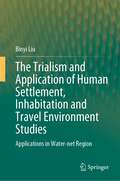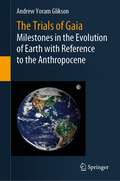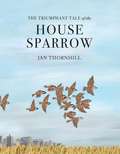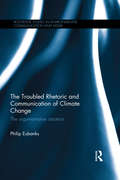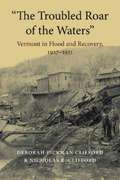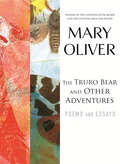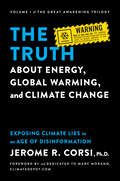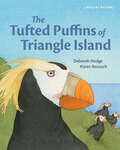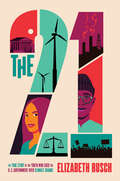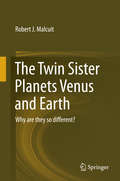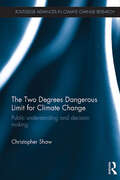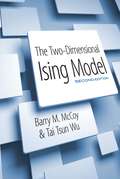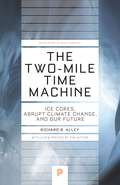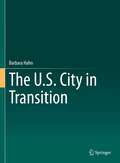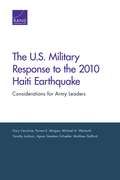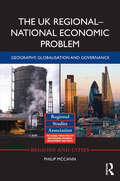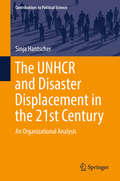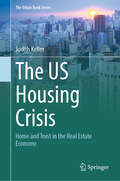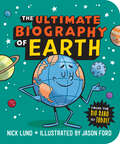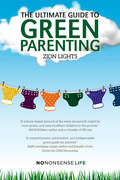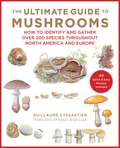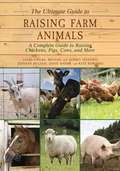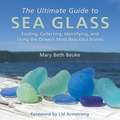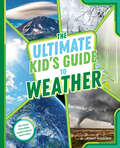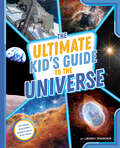- Table View
- List View
The Trialism and Application of Human Settlement, Inhabitation and Travel Environment Studies: Applications in Water-net Region
by Binyi LiuThis book studies human settlements in China in terms of Human Settlements Trialism in 5 typical human settlement types: river valleys, water networks, hills, plains, and arid areas. Focusing on 3 elements of Trialism—(1) natural and constructed environments, resources, and visual landscapes in human settlements background; (2) survival strategies, customs, culture, and values in human settlements activity; and (3) the layout of time and space as well as the planning and design of the urban, the country, and the wilderness in human settlements construction—the book analyzes the evolution of human settlements and predicts future trends. Presenting academic researchers and graduate students in various fields with insights from landscape architecture, urban planning, architecture, geography, forestry, art, and psychology, the study discusses the principles of interactive physiological thinking and systematically theoretical philosophy related to professional physiology, planning and design principles, and traditional and modern methods and technologies in urban and rural construction. The innovative multi-discipline study promotes the planning and design of 5 types of human settlement, which is helpful to the judgment of value, activity rule, and living style of human settlements, and also discusses the development of human settlements in the new millennium.
The Trials of Gaia: Milestones in the Evolution of Earth with Reference to the Anthropocene
by Andrew Yoram GliksonThis books presents a documentation and resulting perspectives regarding James Lovelock's multidisciplinary evolution theory. It looks at past and current climate changes and their consequences, including detailed accounts of the global warming. The connection between climate trajectories and extreme weather events, including tropical and arctic fronts, cyclones, fire storms, tropical storms, acidification, tsunami, floods, sea level rise, are referred to in connection with recent developments. The book updates earlier accounts regarding extreme weather events and mass extinctions.The book “The Trials of Gaia” is published in honour of the late Professor James Lovelock (26 July 1919 – 26 July 2022), the father of the Gaia theory.
The Triumphant Tale of the House Sparrow
by Jan Thornhill“The content encourages us to reflect upon and evaluate the relationship between human beings and animals. This book leaves us with admiration for this feisty bird and hope for our world.” — Friends Journal Behold the most despised bird in human history!So begins Jan Thornhill’s riveting, beautifully illustrated story of the House Sparrow. She traces the history of this perky little bird, one of the most adaptable creatures on Earth, from its beginnings in the Middle East to its spread with the growth of agriculture into India, North Africa and Europe. Everywhere the House Sparrow went, it competed with humans for grain, becoming such a pest that in some places “sparrow catcher” became an actual job and bounties were paid to those who got rid of it.But not everyone hated the House Sparrow, and in 1852, fifty pairs were released in New York City. In no time at all, the bird had spread from coast to coast. Then suddenly, at the turn of the century, as cars took over from horses and there was less grain to be found, its numbers began to decline. As our homes, gardens, cities and farmland have changed, providing fewer nesting and feeding opportunities, the House Sparrow’s numbers have begun to decline again — though in England and Holland this decline appears to be slowing. Perhaps this clever little bird is simply adapting once more.This fascinating book includes the life history of the House Sparrow and descriptions of how the Ancient Egyptians fed it to the animals they later mummified, how it traveled to Great Britain as a stowaway on ships carrying Roman soldiers, and how its cousin, the Eurasian Tree Sparrow, was almost eradicated in China when Mao declared war on it. A wealth of back matter material is also supplied.Key Text Featuresmapglossaryreferencesresourcesfurther informationCorrelates to the Common Core State Standards in English Language Arts:CCSS.ELA-LITERACY.RI.3.3Describe the relationship between a series of historical events, scientific ideas or concepts, or steps in technical procedures in a text, using language that pertains to time, sequence, and cause/effect.CCSS.ELA-LITERACY.RI.3.7Use information gained from illustrations (e.g., maps, photographs) and the words in a text to demonstrate understanding of the text (e.g., where, when, why, and how key events occur).CCSS.ELA-LITERACY.RI.4.3Explain events, procedures, ideas, or concepts in a historical, scientific, or technical text, including what happened and why, based on specific information in the text.CCSS.ELA-LITERACY.RI.5.3Explain the relationships or interactions between two or more individuals, events, ideas, or concepts in a historical, scientific, or technical text based on specific information in the text.CCSS.ELA-LITERACY.RI.6.2Determine a central idea of a text and how it is conveyed through particular details; provide a summary of the text distinct from personal opinions or judgments.
The Troubled Rhetoric and Communication of Climate Change: The argumentative situation (Routledge Studies in Environmental Communication and Media)
by Philip EubanksDespite an overwhelming scientific consensus, climate change remains one of the most controversial issues of our time. Focusing on the rhetoric that surrounds the issue of climate change, this groundbreaking book analyses why the debate continues to rage and examines how we should argue when winning the argument really matters. Going beyond routine condemnations of the wildest statements made by religious fundamentalists or spokespeople for fossil fuel interests, the book explains the mutually exacerbating problems that permit many of us greet catastrophic predictions with an equivocal shrug. It argues that the argumentative situation around climate change makes a certain kind of skepticism – "fair-minded skepticism" – not only possible but likely. The book also strikes a hopeful note, reminding us that people do change their minds in response to effective argumentation that appeals to deeply shared values. Offering new insight into an ongoing academic discussion about the nature of argument and how it can be undertaken more effectively and ethically, as well as a new perspective on the rhetoric of science and technology, this book will be a valuable resource to students and scholars of climate change, environmental humanities, rhetoric, environmental communication, sociology and science and technology studies.
The Troubled Roar Of The Waters: Vermont In Flood And Recovery, 1927-1931
by Deborah Pickman Clifford Nicholas R. CliffordIn their new book, Deborah Pickman Clifford and Nicholas R. Clifford revisit the devastating flood that wreaked unprecedented destruction on New England in November 1927. Vermont sustained the greatest damage by far, with eighty-four deaths (or three-quarters of the total casualties) and property losses totaling thirty to forty million in 1927 dollars (more than eighty-six dollars for every man, woman, and child then in the state). These losses were proportionally far higher than the corresponding ones suffered in the regions ravaged by the huge Mississippi floods earlier that year. In these pre-FEMA years and in true Green Mountain State style, Vermonters by and large had to confront the emergency on their own, and this at a time when the boom of the mid and late 1920s had largely bypassed Vermont, a rural state with little industry and a stagnant population. Contrary to popular belief, however,Vermont did accept federal, Red Cross, and other outside assistance. "The Troubled Roar of the Waters" is the story of the flood, the formation and work of emergency relief committees, the efforts to rebuild in a harsh climate, and the ways in which the disaster fundamentally affected the state's political and social development. Though the 1920s traditionally have been represented primarily as a prelude to the Depression and the New Deal, new scholarship sees the nation entering a period of rapid and unnerving change in these years. Cities and suburbs mushroomed, the automobile revolutionized society, new and larger forms of business and industry flourished, and tensions mounted between new immigrants and the "old stock. " The Cliffords build on this, using public and private archival collections to inform their riveting story, fleshing out the historical record and adding key perspectives to this broader emerging debate over how the decade is viewed. For specialists and general readers alike, the authors place the story of the 1927 flood within the larger context of early twentieth-century American history, establishing the event and its aftermath as emblematic of the age.
The Truro Bear and Other Adventures: Poems and Essays
by Mary OliverThe Truro Bear and Other Adventures, a companion volume to Owls and Other Fantasies and Blue Iris, brings together ten new poems, thirty-five of Oliver's classic poems, and two essays all about mammals, insects, and reptiles. The award-winning poet considers beasts of all kinds: bears, snakes, spiders, porcupines, humpback whales, hermit crabs, and, of course, her beloved but disobedient little dog, Percy.
The Truth about Energy, Global Warming, and Climate Change: Exposing Climate Lies in an Age of Disinformation
by Jerome R. CorsiThis book exposes the truth that the climate change hoax is a political movement aimed at eliminating capitalism by spreading alarming disinformation that in order to &“save the Earth&” from global warming, we must reduce carbon dioxide emissions by switching from hydrocarbon fuels to renewable energies.The Truth about Energy, Global Warming, and Climate Change: Exposing Climate Lies in an Age of Disinformation reveals a science-based understanding of Earth&’s climate and temperature that Green New Deal proponents are trying to hide. In the pages of this book, you will see scientifically documented evidence for many facts that the radical left denies. Want to know the truth about how energy, temperature, and climate work? Read The Truth about Energy, Global Warming, and Climate Change—but prepare to be shocked. Jerome R. Corsi has conducted a tour-de-force examination of peer-reviewed climate science that exposes the neo-Marxists behind today&’s anti-capitalist global warming hoax.
The Tufted Puffins of Triangle Island (Wild by Nature)
by Deborah HodgeThousands of beautiful tufted puffins arrive each spring to lay their eggs on the remote and rugged Triangle Island, a rare and protected habitat. In this lushly illustrated first book in the Wild by Nature series, young readers will meet a pair of puffins preparing a burrow on the steep cliffside of Triangle Island, off the northwestern tip of Vancouver Island. In this remarkable place, they will lay a single egg and raise their baby. Here, the birds are protected, and there is ample space to nest, and fish to eat. At summer’s end, the puffins, young and old, fly away to live at sea. The young puffins will live on the ocean until they are mature enough to return to their birthplace and lay their own eggs. If Triangle Island remains undisturbed, and the ocean stays cool, clean and full of fish, the new baby puffins will continue to thrive and grow. Includes an author’s note about Triangle Island and other sea birds that nest there. WILD BY NATURE A series for young readers that explores the unique links between ecologically sensitive species and their habitats, and encourages the preservation of the world’s wild places. Key Text Features illustrations author’s note further information further reading facts Correlates to the Common Core State Standards in English Language Arts: CCSS.ELA-LITERACY.RI.1.3 Describe the connection between two individuals, events, ideas, or pieces of information in a text. CCSS.ELA-LITERACY.RI.2.6 Identify the main purpose of a text, including what the author wants to answer, explain, or describe. CCSS.ELA-LITERACY.RI.2.7 Explain how specific images (e.g., a diagram showing how a machine works) contribute to and clarify a text.
The Twenty-One: The True Story of the Youth Who Sued the U.S. Government Over Climate Change
by Elizabeth RuschCompelling and timely, award-winning author Elizabeth Rusch’s The Twenty-One tells the gripping inside story of the ongoing landmark federal climate change lawsuit, Juliana vs. United States of America. The Twenty-One is for readers of Christina Soontornvat’s All Thirteen, fans of Steve Sheinkin’s books, and anyone interested in the environment and climate change, as well as youth activism, politics and government, and the law. From severe flooding in Louisiana to wildfires in the Pacific Northwest to melting permafrost in Alaska, catastrophic climate events are occurring more frequently—and severely—than ever. And these events are having a direct impact on the lives (and futures) of young people and their families. In the ongoing landmark case Juliana vs. United States, twenty-one young plaintiffs claim that the government’s support of the fossil-fuel industry is actively contributing to climate change, and that all citizens have a constitutional right to a stable climate—especially children and young adults, because they cannot vote and will inherit the problems of the future.Elizabeth Rusch’s The Twenty-One is a gripping legal and environmental thriller that tells the story of twenty-one young people and their ongoing case against the U.S. government for denying their constitutional right to life and liberty. A rich, informative, and multifaceted read, The Twenty-One stars the young plaintiffs and their attorneys; illuminates the workings of the United States’s judicial system and the relationship between government, citizens’ rights, and the environment; and asks readers to think deeply about the future of our planet. Features extensive backmatter, including a timeline, glossary, call to action, additional resources, and photographs.
The Twin Sister Planets Venus and Earth
by Robert J. MalcuitThis book explains how it came to be that Venus and Earth, while very similar in chemical composition, zonation, size and heliocentric distance from the Sun, are very different in surface environmental conditions. It is argued here that these differences can be accounted for by planetoid capture processes and the subsequent evolution of the planet-satellite system. Venus captured a one-half moon-mass planetoid early in its history in the retrograde direction and underwent its "fatal attraction scenario" with its satellite (Adonis). Earth, on the other hand, captured a moon-mass planetoid (Luna) early in its history in prograde orbit and underwent a benign estrangement scenario with its captured satellite.
The Two Degrees Dangerous Limit for Climate Change: Public Understanding and Decision Making (Routledge Advances in Climate Change Research)
by Christopher ShawThis book is about the history, present and future of one the most important policy ideas of the modern era – that there is a single, global dangerous amount of climate change. That dangerous amount of climate change is imagined as two degrees centigrade of global warming above the pre-industrial average. Though the two degree idea is based on the value system of elite policy actors, it is been constructed in public discourses as scientific fact. This false representation of the concept undermines opportunities for positive public engagement with the climate policy debate, yet it is strong public engagement which is a recurring aspiration of climate policy discourses and is considered essential if climate mitigation strategies are to work. Alongside a critical analysis of how the idea of a single dangerous limit has shaped our understanding of what sort of problem climate change is, the book explains how the public have been kept out of that decision making process, the implications of this marginalisation for climate policy and why the dangerous limit idea is undermining our ability to mitigate climate change. The book concludes by exploring possibilities for a deliberation about the future of the two degree limit which allows for public participation in the decision making process. This book illustrates why, at this critical juncture in the climate policy debate, the two degree limit idea has failed to achieve any of the policy goals intended. This is the first book dedicated to questioning the issue of the two degree limit within a social science framework and should be of interest to students and scholars of environmental policy and politics, climate change communication, and science, technology and society studies.
The Two-Dimensional Ising Model: Second Edition
by Barry M. Mccoy Prof. Tai Tsun Wu"Of all the systems in statistical mechanics on which exact calculations have been performed," declare the authors of this text, "the two-dimensional Ising model is not only the most thoroughly investigated; it is also the richest and most profound." Originally published in 1973, this is the definitive survey of the Ising model, a mathematical model of ferromagnetism in statistical mechanics. This updated edition of the classic text features an extensive section on new developments. Geared toward advanced undergraduates and graduate students of physics, it is also suitable for physicists working in statistical mechanics and related fields. Following a brief introductory chapter, the book explores statistical mechanics, the one-dimensional Ising model, dimer statistics, specific heat of Onsager's lattice in the absence of a magnetic field, boundary specific heat and magnetization, and boundary spin-spin correlation functions. Subsequent chapters cover the correlation functions, Wiener-Hopf sum equations, spontaneous magnetization, behavior of the correlation functions, asymptotic expansion, and boundary hysteresis and spin probability functions. Two other chapters examine Ising models with random impurities in terms of specific heat and boundary effects. The book concludes with a new chapter examining developments in the field since 1973.
The Two-Mile Time Machine: Ice Cores, Abrupt Climate Change, and Our Future - Updated Edition (Princeton Science Library #31)
by Richard B. AlleyIn the 1990s Richard B. Alley and his colleagues made headlines with the discovery that the last ice age came to an abrupt end over a period of only three years. In The Two-Mile Time Machine, Alley tells the fascinating history of global climate changes as revealed by reading the annual rings of ice from cores drilled in Greenland. He explains that humans have experienced an unusually temperate climate compared to the wild fluctuations that characterized most of prehistory. He warns that our comfortable environment could come to an end in a matter of years and tells us what we need to know in order to understand and perhaps overcome climate changes in the future.In a new preface, the author weighs in on whether our understanding of global climate change has altered in the years since the book was first published, what the latest research tells us, and what he is working on next.
The U.S. City in Transition
by Barbara HahnThe U.S. city is undergoing constant change. In the East and Midwest, most cities were founded as trading posts on waterways. They boomed during the industrial era and reached their population peak in the mid-20th century, before suburbanization and deindustrialization caused them to decline in importance. Traces of decay were everywhere, and the prognosis for the future was conceivably poor. As Barbara Hahn shows in her book, this trend now seems to have been broken: Things are looking up again for the US city. Some of the former industrial cities have succeeded in structural change. In the south and west of the country, cities have developed into new growth centers. However, not all cities are benefiting from this positive development, and many continue to shrink at an alarming rate. As the author points out, similar processes such as neoliberalisation, deregulation, privatisation and gentrification can be observed in all cities, regardless of their location and level of development.Due to the large number of didactically prepared graphics, the book is suitable as a study read for students and scholars. The characteristics of the U.S. city, which are elaborated on the basis of current examples, as well as the illustrative photos also illustrate the change of the U.S. city to the interested reader.
The U.S. Military Response to the 2010 Haiti Earthquake: Considerations for Army Leaders
by Agnes Gereben Schaefer Forrest E. Morgan Gary Cecchine Michael A. Wermuth Matthew Stafford Timothy JacksonThis report examines how Joint Task Force Haiti (JTF-Haiti) supported the humanitarian assistance and disaster relief efforts in Haiti. It focuses on how JTF-Haiti was organized, how it conducted Operation Unified Response, and how the U. S. Army supported that effort. The analysis includes a review of existing authorities and organizations and explains how JTF-Haiti fit into the U. S. whole-of-government approach and the international response.
The UK Regional-National Economic Problem: Geography, globalisation and governance (Regions and Cities)
by Philip McCannIn recent years, the United Kingdom has become a more and more divided society with inequality between the regions as marked as it has ever been. In a landmark analysis of the current state of Britain’s regional development, Philip McCann utilises current statistics, examines historical trends and makes pertinent international comparisons to assess the state of the nation. The UK Regional–National Economic Problem brings attention to the highly centralised, top down governance structure that the UK deploys, and demonstrates that it is less than ideally placed to rectify these inequalities. The ‘North-South’ divide in the UK has never been greater and the rising inequalities are evident in almost all aspects of the economy including productivity, incomes, employment status and wealth. Whilst the traditional economic dominance of London and its hinterland has continued along with relative resilience in the South West of England and Scotland, in contrast the Midlands, the North of England, Northern Ireland and Wales lag behind by most measures of prosperity. This inequality is greatly limiting national economic performance and the fact that Britain has a below average standard of living by European and OECD terms has been ignored. The UK’s economic and governance inequality is unlikely to be fundamentally rebalanced by the current governance and connectivity trends, although this definitive study suggests that some areas of improvement are possible if they are well implemented. This pivotal analysis is essential reading for postgraduate students in economics and urban studies as well as researchers and policy makers in local and central government.
The UNHCR and Disaster Displacement in the 21st Century: An Organizational Analysis (Contributions to Political Science)
by Sinja HantscherThis book offers an in-depth case study on the leading international refugee agency, the United Nations High Commissioner for Refugees (UNHCR), and its approach to environmentally displaced persons. The author examines the UNHCR on the basis of expert interviews and content analysis in order to highlight why and how the organization is addressing the issue. The analysis draws on organizational as well as security theory, offering readers a better understanding of the connection between the two. The book appeals to scholars in the fields of migration and organizational studies, as well as policymakers and professionals working in international organizations.
The US Housing Crisis: Home and Trust in the Real Estate Economy (The Urban Book Series)
by Judith KellerThis book aims to draw careful distinctions between the various forms of housing insecurity and personal circumstances research participants experience. While the urgency of the housing crisis in the US has produced a lot of scholarly work on housing, it often fails to recount the real life struggles that the housing crisis is causing. This is where the book provides a distinct contribution to housing studies and urban geography. The author use of trust as an analytical lens, her qualitative approach, and her work with people on the ground aim to move away from a quantitative understanding of the crisis by giving it a human face. The author seeks to bring to light the human costs of the destruction of home as well as the political reactions and day-to-day strategies that residents apply to make ends meet in times of the US housing crisis.
The Ultimate Biography of Earth: From the Big Bang to Today!
by Nick LundThe story of planet Earth, its history and how and why it changes over time, for kids 10 and up. Here's Earth's "biography" through the eras, eons, and ages, including extinction events (sorry, dinosaurs!) and introduction of new species (hello, humans!), told in biography form, with lots of humor, illustrations, and facts.
The Ultimate Guide to Green Parenting
by Zion LightsThe Ultimate Guide to Green Parenting is the first book of its kind. Journalist, science writer and mother Zion Lights has researched all those questions that beset new or expecting parents – not just about environmental issues but also on approaches to parenting. She focuses on the scientific evidence rather than on the latest fad or personal anecdote and the result is a book that will help you adjust your lifestyle in practical ways that work for you and your child. From birth to nutrition and from diapers to travel, advice based on research and evidence can guide the way. And the good news is that going green will not only help to save the planet and help to protect your child’s health, it will also result in a happier and more fulfilling family life.
The Ultimate Guide to Mushrooms: How to Identify and Gather Over 200 Species Throughout North America and Europe
by Guillaume EyssartierEverything You Could Ever Want to Know about Mushrooms! Mushrooms are an incredibly vast range of species, including all shapes and sizes and colors. This exciting collection includes a wealth of information on two hundred essential mushroom varieties, including their: Scientific namesHabitatsModes of developmentBotanical specificitiesUses in culinary cuisineAnd more! Spread throughout this book are hand-drawn illustrations and full-color photographs of every mushroom you can imagine. Whether you want to identify mushrooms, study mushrooms, or use edible mushrooms in your recipes, The Ultimate Guide to Mushrooms is for you!
The Ultimate Guide to Raising Farm Animals: A Complete Guide to Raising Chickens, Pigs, Cows, and More (The\joy Of Ser.)
by Laura Childs Kate Rowinski Jessie Shiers Jennifer Megyesi Michael Levatino Audrey LevatinoImagine putting together a big breakfast using the eggs straight from your own chickens, or bacon straight from the pig. This is a sort of ideal that many dream of, but few ever get to experience. Now with The Ultimate Guide to Raising Farm Animals, that dream can be turned into a reality, and also be so much more.In The Ultimate Guide to Raising Farm Animals, you will learn how to take care of chickens, pigs, sheep, cows, and other livestock. Each chapter will be dedicated to a different animal, and you will not only learn how to take care of them, but also what sort of things you can get from them. If you want to save money, become more self-sufficient, or enjoy healthier locally sourced food, The Ultimate Guide to Raising Farm Animals is the book you need.
The Ultimate Guide to Sea Glass: Finding, Collecting, Identifying, and Using the Ocean's Most Beautiful Stones
by Mary Beth Beuke Lisl ArmstrongAs the owner of one of the world's most elaborate sea glass collections, Mary Beth Beuke gets to talk about these prized ocean gems on a daily basis. Unfortunately, with each passing day, sea glass becomes more and more difficult to find, making the hunt more of a challenge to the seeker-especially one with limited experience in sea glass hunting.There are several reasons why the hunt is so important to the sea glass seeker. Some find their Zen moments in the solitude and beauty of the hunt. Some collect to add color to their life. The history, mystery, and discovery of sea glass are also strong forces that draw collectors to shorelines around the world, looking for these pieces of physically and chemically weathered frosted glass.Whatever your reason for wanting to learn about and start your own collection of sea glass, the window for doing so is closing as pieces are becoming more elusive due to a growth in sea glass popularity and a decrease in recent glass bottle production.In The Ultimate Guide to Sea Glass, Beuke provides information that will help first-time seekers start new collections and veteran hunters learn more about their current sets. Beuke shares her experiences in gathering her own collection via photographs of vibrant and rare pieces, as well.
The Ultimate Kid's Guide to Weather: At-Home Activities, Experiments, and More! (The Ultimate Kid's Guide to...)
by Jenny MarderWith stunning photos of Earth's wildest weather and easy at-home STEM activities, this is the only guide kids need on their journey of learning about all things meteorology.Buckle up and let Jenny Marder, a senior writer for NASA, be your guide through the Earth&’s atmosphere! First stop: the stratosphere!
The Ultimate Kid's Guide to the Universe: At-Home Activities, Experiments, and More! (The Ultimate Kid's Guide to...)
by Jenny MarderWith stunning photos of outer space and easy at-home experiments, this is the only guide kids need on their journey of learning about all things astronomy: the stars, the planets, the moon, and so much more!Buckle up and let Jenny Marder, a senior writer for NASA, be your guide to the universe! First stop: the moon!A perfect read for kids, just in time for the April 2024 total solar eclipse!
